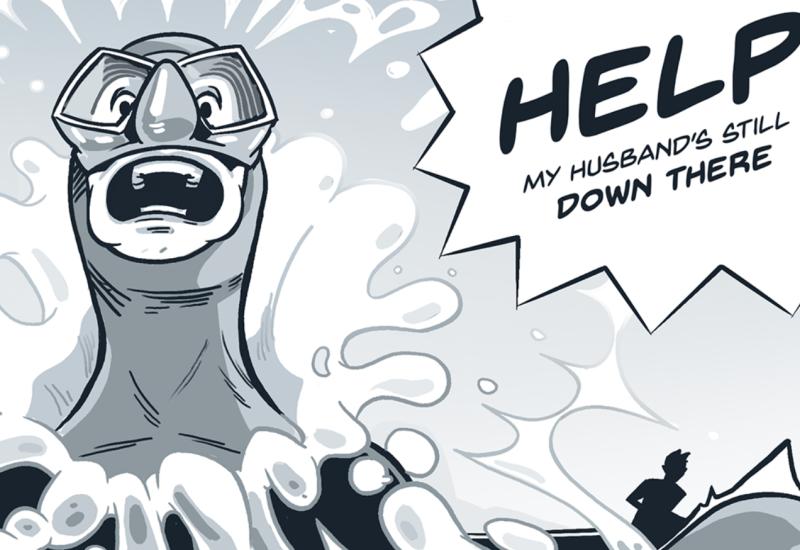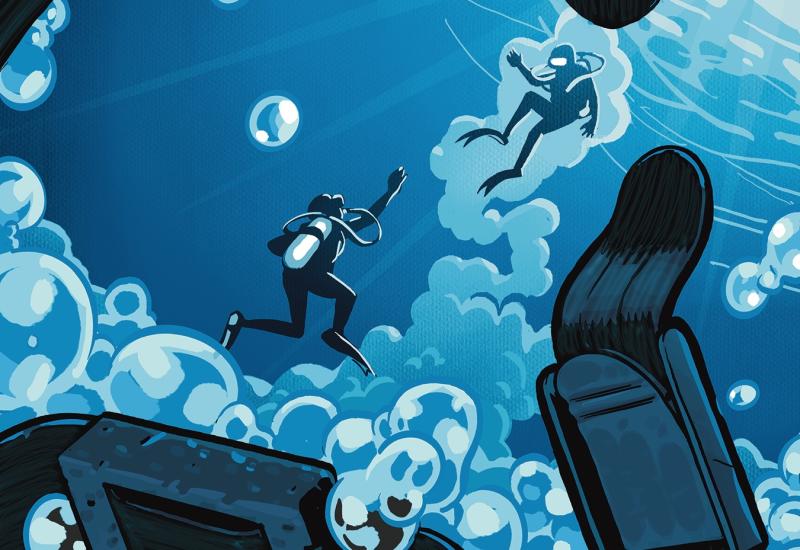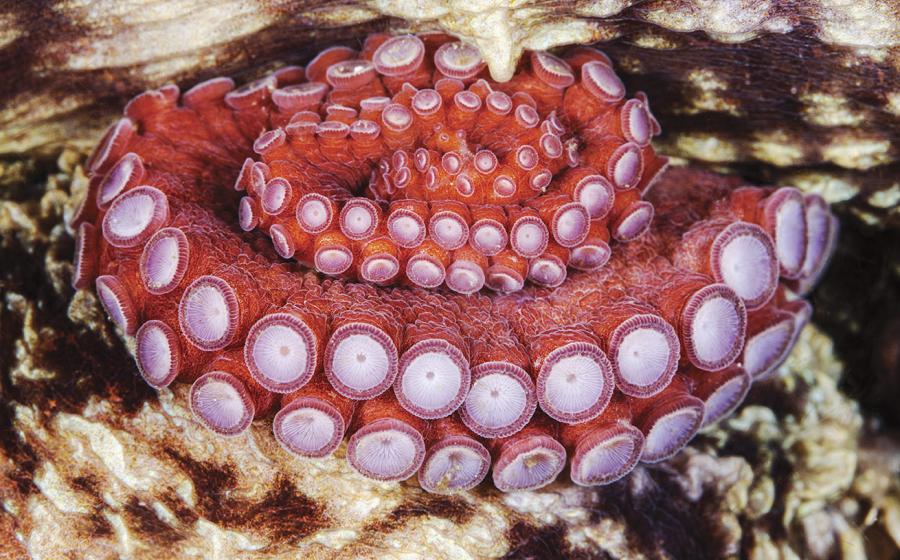Swept Away
October 2003
With the reef speeding by faster and faster, Darlene glanced to her right and saw the sea fans bent at right angles by the current. Looking back to her left, she frantically signaled to her buddy, Ted. They turned into the current, desperately fighting their way back to the boat. Before long, Darlene saw the needle on her pressure gauge fall into the red zone and realized the struggle with the current was futile. She and Ted surfaced in building seas and watched helplessly as their sailboat became a smaller and smaller speck against the backdrop of a setting sun.
The Divers
Darlene and Ted were water sports enthusiasts in their early 40s. They had been dating for two years and thought an island getaway on Ted's sailboat would be an ideal way to celebrate their anniversary. Both divers completed advanced open-water certification in preparation for their trip to the Caribbean.
The Dive
After four consecutive days of making shallow water reef dives, the couple decided to take advantage of unusually calm seas and explore the windward side of the island. It was late afternoon when they anchored the boat and entered the water for a dive to 50 feet.
The Accident
Thirty minutes into their dive, Ted and Darlene noticed that they had begun to drift slowly over the surface of the reef. They attributed the dropping visibility to the sun moving closer to the western horizon. Forty minutes into the dive, Darlene noticed the current had picked up dramatically. With a degree of alarm, she realized that they had ignored their training and started the dive by swimming downcurrent from the stern of the boat. The current had been so slight that this decision seemed of little consequence at the time.
After briefly struggling to swim against the current, Darlene and Ted surfaced, careful to remain in close proximity to each other. As the sun set, the pair could see that the current was still sweeping them farther from their boat.
Switching to snorkels to conserve the air in their cylinders and to avoid swallowing seawater, the divers dropped their weights and inflated their marker buoys. Ted also had a strobe light for use as a surface signaling device. Unfortunately, it had been several months since the batteries were changed and the light was useless ballast. As darkness fell, the current swept them around a point of land and the couple lost sight of their boat.
The Rescue
Unfortunately, the divers were in an area that was not frequented by boaters, and they had left no one aboard their vessel. They had also failed to file a float plan or to alert anyone on shore to watch for their return. The couple drifted helplessly through the night, talking with each other to fight off panic and to stay awake in the face of hypothermia. Throughout the night, they could see the lights of the nearby island, giving them hope of an early morning rescue.
Just after dawn on the following day, a small sportfishing yacht spotted them adrift, rescued them and graciously offered the divers warm blankets, dry clothes, food and water. When Ted and Darlene returned to the harbor, they arranged a small boat to transport them around the island in search of their sailboat. Thanks to divine intervention, or extreme luck, not only did the divers survive this incident without injury, their boat was recovered with only minor canvas damage caused by strong winds during the night.
Analysis
Although these divers properly equipped themselves for their dive with surface markers and strobe lights, their first mistake was failing to ensure that these items worked.
In an effort to have the ideal romantic getaway, Ted and Darlene traveled alone and maintained a flexible schedule. This desire for privacy led them to dive from an unattended boat, and fail to give anyone notice of their plans.
Darlene and Ted broke all the rules, but they did one thing right — when the situation looked bad, they managed to focus on survival and maintain cool heads. That, along with a good bit of luck, kept them alive to be rescued. "God takes care of drunks and fools," says Darlene of their good fortune. Ted points out that both divers have "decided not to verify the adage with a second trial at being fools on the water."
Good choice.
Lessons for Life
-
Always check your dive equipment prior to the dive. This is especially true for seldom-used safety equipment.
-
Never leave a dive boat unattended. Always leave a responsible party on board who can move the vessel down current to retrieve a distressed diver. The person manning the boat should also be able to operate a marine radio and summon help.
-
Always file a float plan when diving from a private boat. If your plans change, it is quite acceptable to use the vessel's radio or a cell phone to notify someone onshore.
-
Currents can and do change. Always begin your dive by swimming into the current, even if the current is slight.
-
Dive in well-trafficked areas when diving from a private vessel with limited topside support. The additional boat traffic may increase your odds of being rescued.
October 2003
With the reef speeding by faster and faster, Darlene glanced to her right and saw the sea fans bent at right angles by the current. Looking back to her left, she frantically signaled to her buddy, Ted. They turned into the current, desperately fighting their way back to the boat. Before long, Darlene saw the needle on her pressure gauge fall into the red zone and realized the struggle with the current was futile. She and Ted surfaced in building seas and watched helplessly as their sailboat became a smaller and smaller speck against the backdrop of a setting sun.
The Divers
Darlene and Ted were water sports enthusiasts in their early 40s. They had been dating for two years and thought an island getaway on Ted's sailboat would be an ideal way to celebrate their anniversary. Both divers completed advanced open-water certification in preparation for their trip to the Caribbean.
The Dive
After four consecutive days of making shallow water reef dives, the couple decided to take advantage of unusually calm seas and explore the windward side of the island. It was late afternoon when they anchored the boat and entered the water for a dive to 50 feet.
The Accident
Thirty minutes into their dive, Ted and Darlene noticed that they had begun to drift slowly over the surface of the reef. They attributed the dropping visibility to the sun moving closer to the western horizon. Forty minutes into the dive, Darlene noticed the current had picked up dramatically. With a degree of alarm, she realized that they had ignored their training and started the dive by swimming downcurrent from the stern of the boat. The current had been so slight that this decision seemed of little consequence at the time.
After briefly struggling to swim against the current, Darlene and Ted surfaced, careful to remain in close proximity to each other. As the sun set, the pair could see that the current was still sweeping them farther from their boat.
Switching to snorkels to conserve the air in their cylinders and to avoid swallowing seawater, the divers dropped their weights and inflated their marker buoys. Ted also had a strobe light for use as a surface signaling device. Unfortunately, it had been several months since the batteries were changed and the light was useless ballast. As darkness fell, the current swept them around a point of land and the couple lost sight of their boat.
The Rescue
Unfortunately, the divers were in an area that was not frequented by boaters, and they had left no one aboard their vessel. They had also failed to file a float plan or to alert anyone on shore to watch for their return. The couple drifted helplessly through the night, talking with each other to fight off panic and to stay awake in the face of hypothermia. Throughout the night, they could see the lights of the nearby island, giving them hope of an early morning rescue.
Just after dawn on the following day, a small sportfishing yacht spotted them adrift, rescued them and graciously offered the divers warm blankets, dry clothes, food and water. When Ted and Darlene returned to the harbor, they arranged a small boat to transport them around the island in search of their sailboat. Thanks to divine intervention, or extreme luck, not only did the divers survive this incident without injury, their boat was recovered with only minor canvas damage caused by strong winds during the night.
Analysis
Although these divers properly equipped themselves for their dive with surface markers and strobe lights, their first mistake was failing to ensure that these items worked.
In an effort to have the ideal romantic getaway, Ted and Darlene traveled alone and maintained a flexible schedule. This desire for privacy led them to dive from an unattended boat, and fail to give anyone notice of their plans.
Darlene and Ted broke all the rules, but they did one thing right — when the situation looked bad, they managed to focus on survival and maintain cool heads. That, along with a good bit of luck, kept them alive to be rescued. "God takes care of drunks and fools," says Darlene of their good fortune. Ted points out that both divers have "decided not to verify the adage with a second trial at being fools on the water."
Good choice.
Lessons for Life
Always check your dive equipment prior to the dive. This is especially true for seldom-used safety equipment.
Never leave a dive boat unattended. Always leave a responsible party on board who can move the vessel down current to retrieve a distressed diver. The person manning the boat should also be able to operate a marine radio and summon help.
Always file a float plan when diving from a private boat. If your plans change, it is quite acceptable to use the vessel's radio or a cell phone to notify someone onshore.
Currents can and do change. Always begin your dive by swimming into the current, even if the current is slight.
Dive in well-trafficked areas when diving from a private vessel with limited topside support. The additional boat traffic may increase your odds of being rescued.










